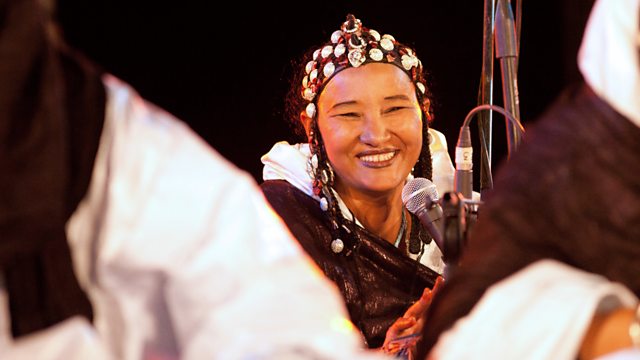When Fadimata Walet Oumar sang and danced around the fires at home each night, little did she know she would become a woman who would go down in history as one of the saviours of the tunes of the Sahara.
Born around 1960 in Gargando, between the north and the south of Mali (a landlocked country in West Africa), she learned how to sing and dance under the light of the desert moon.
Her people were nomads who traditionally lived on the fringes of the Sahara precisely the area called the Circle of Goundam at the southern limit of Azawad. This all changed due to successive wars, famines and droughts.
Fadimata’s passion for music never waned despite these. She had always led the life of a Tuareg nomad during her youth – a life characterized by singing in the evenings around the fire, accompanied on the anzad. It is her obsession with music that earned her the nickname Disco after winning dance battles on the streets of Timbuktu in Mali.
She went on to create a band in 1995 called Tartit in collaboration with other women who had been forced to flee to refugee camps due to the incessant conflict.
Tartit became the first woman-led music group in the growing desert music scene and received global recognition.
They went on until Islamist militants took over northern Mali and banned music on 22nd August 2012, when Osama Ould Abdel Kader, a spokesperson for MUJAO (Movement for Oneness and Jihad in West Africa), proclaimed music forbidden.
This was unusual because Mali is the only country in the world to give musicians a special social class – they are known as the griots. These people were given the singular honour to communicate the oral history of the tribe or village, as well as entertain natives with songs and stories.
Walet Oumar was shattered and had to flee her homeland for the third time in her life but pledged to return.
“Before the Islamists had even reached Timbuktu, I had left Mali and gone to a refugee camp in Burkina Faso. I somehow knew this was going to be a dark time for Mali – especially for its musicians. My band ended up being split between Mauritania and Burkina Faso because when we chose to flee we headed for the closest border. At that time, some of the band were closer to Mauritania and I was closer to Burkina Faso. I went to the camp on 2 February 2012 and whilst I knew the situation was very bad, I could never have imagined just how cruel and dark the conflict would become. I could never in my life imagine that they would ban music. I could not think it – I did not believe it was even possible. It happened so fast, and I truly believed that life, as we knew it in Mali, was over. All the information and news is passed on to the people through music. These groups wanted to stop the people from being given information and they wanted to stop us telling our history to the next generation
At the refugee camp, we continued to play music, organising dances and parties. One of the important things about music is that it allows you to forget, to put your problems out of your mind for a little while. But sometimes I would get so upset, seeing more and more people arrive at the refugee camp every day, and hearing the news from Mali, that I would lose my voice, my throat would just close up,” she recounted.
By July 2012, a large portion of Timbuktu’s ancient shrines had been destroyed and this was in addition to attacks on Mali’s most powerful cultural and political commentators – the griots, the class of people Fadimata belonged to.
These Jihadists destroyed instruments and equipment of musicians, set radio stations ablaze and even beat up young people with musical-sounding ringtones on their mobile phones.
A lot of musicians were on the run and fled to refugee camps in Mauritania or Burkina Faso. Those who were signed onto European record labels migrated to Paris.
Those in Paris formed a group, Voices United for Mali, which consisted of more than 40 singers and musicians. Their single, “Mali-Ko”, called upon all Malians to stand up for peace in the wake of the extremist occupation.
The lyrics said:
The world adored our country, so why now are we tearing each other apart before their very eyes?
Our Mali will never belong to those people. This great nation will not be their victim.
Listen to me: we must take care now or our children will never know the real story of our country.
Fadimata said, “I could never in my life imagine that they would ban music. I could not think it. I did not believe it was even possible. It happened so fast, and I truly believed that life, as we knew it in Mali, was over.”
However, while away she was scared for her parents.
‘I had to be careful to cover my face and not be identified whilst I was performing as I am well known in Mali – my father and other members of my family were still living in the north and I was very afraid for them. I did not want them to be punished in retaliation for my music,” Disco said.
The state of unrest could not be contained even by Mali’s temporary president Dioncounda Traoré who worked with the army.
A year after the start of the conflict, by January 2013, the French and ECOWAS armies arrived in Mali and the uprising and invasion escalated into a fully-fledged war.
The return of music after the war
More musicians are gradually returning to Mali seeing that the state of emergency has officially been lifted
“In Mali, music is the people’s source of information. Music is the press; it is the news. In Mali we don’t have a free press, instead, it is the musicians who pass on the information and tell the stories of our history,” says Fadimata Walet Oumar
“I became a musician after being involved with humanitarian work and living abroad. I was contacted by a festival that wanted an all-female Tuareg band to perform and at this time there was no such thing. They asked if we could form a band and I said, of course, nothing is impossible – it could be hard but we can try. And so we did. I found performing at the festival very liberating, as we were able to share our story with so many different people. As musicians, we could tell the entire world about our culture, our lives and the problems of our people. Music is a miracle, it is an important part of how civilisation develops. Music teaches you how to live, how society can grow and change. The world without music is impossible to imagine.
Music plays an important role in the lives of Tuareg women. Our music gives women liberty. Traditionally women play our music, and that gives us power and rights. We have an important role to play in society and it is through music that we can be heard. These men were seeking to prevent women from participating in their traditional roles. Freedom of expression is the most important thing in the world, and music is a part of freedom. If we don’t have freedom of expression, how can you genuinely have music?” she said.
Today, Fadimata’s organisation that promotes women’s rights has been recognised by the United Nations. Her band Tartit, which means union, are all Tuareg from the Kel Antessar tribe in Mali. They have been dominated by Jihadists in the deserts around the historic city of Timbuktu for centuries and are currently refugees in Burkina Faso.















